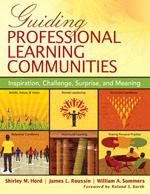Guiding Professional Learning Communities
Inspiration, Challenge, Surprise, and Meaning
- Shirley M. Hord - Learning Forward
- James L. Roussin - Executive Director, Generative Human Systems
- William A. Sommers - Southwest Educational Development Laboratory
Foreword by Roland S. Barth
Professional Learning Communities | School Change, Reform, & Restructuring | Teacher Leadership
"To improve teaching quality and student learning outcomes, someone has to take the reins and lead the effort with intelligence, skill, sensitivity, and a clear sense of purpose. This book offers the 'why' and 'how' to those willing to take on the challenge to accomplish that goal."
—Thomas R. Guskey, Professor of Educational Psychology
University of Kentucky
"This book places 'learning in community' at the forefront of PLC work. The authors provide a treasure trove of cognitively engaging learning opportunities that build a communal knowledge base."
—Diane Zimmerman, Superintendent
Old Adobe Union School District, Petaluma, CA
"Too often PLCs are treated as events. The authors of this fine book make clear that an authentic PLC is about embracing a form of leadership and learning in schools that requires fearless examination of teaching practices, faculty interactions, and student learning toward the goal of increased successful student learning. The book is rich with information, resources, and learning activities revealing how this can be accomplished."
—Robert J. Garmston, Cofounder, Institute for Intelligent Behavior
Professor Emeritus, California State University, Sacramento
The how-to guide for developing, implementing, and sustaining a PLC!
Shirley M. Hord and William A. Sommers' best-selling book Leading Professional Learning Communities introduced educators to the research-based components of an effective professional learning community (PLC). Now this implementation handbook offers more than 30 structured "learning opportunities" to help busy educators put the components into practice.
Ideal as a companion to the original book but also valuable as a standalone resource, this sequel guides educators in developing a new PLC or sustaining an existing one. Members of PLCs can use the engaging learning opportunities to facilitate individual and team development by exploring:
- Beliefs, values, and vision
- Shared leadership
- Structural conditions
- Relational conditions
- Intentional learning
- Sharing personal practice
Guiding Professional Learning Communities is a rich field guide for increasing and enhancing teaching quality through the power of educators learning together.
“Although research on the effectiveness of professional learning communities (PLCs) can best described as ‘mixed,’ one thing is clear: they accomplish nothing without strong, knowledgeable, and courageous leadership. To improve teaching quality and student learning outcomes, someone has to take the reins and lead the effort with intelligence, skill, sensitivity, and a clear sense of purpose. This book offers the ‘why’ and the ‘how’ to those willing to take on the challenge.”
"One weekend morning, I sat down with my cup of coffee to read a book, and much to my delight, two hours later, I had not read a book, but rather mapped out a learning plan for an entire year. The best gift of all, everything I will need is right here in this book. When you sit down to read this book, make sure you have a calendar at your side. Get ready to go on a shopping spree of ideas; like all good shoppers choose wisely, for there is no way you can possibly use all of the ideas in this book in one year. I assure you, you will not have buyer’s remorse!"
“Too often PLCs are treated as events. The authors of this fine book make clear that an authentic PLC is neither an event nor a name. It is about embracing a form of leadership and learning in schools that requires fearless examination of teaching practices, faculty interactions, and student learning toward the goal of increased successful student learning. The book is so rich with information, resources, and learning activities revealing how this can be accomplished that it could serve as syllabus for a graduate course in school improvement.”
Comprehensive and met the goals of the course.
